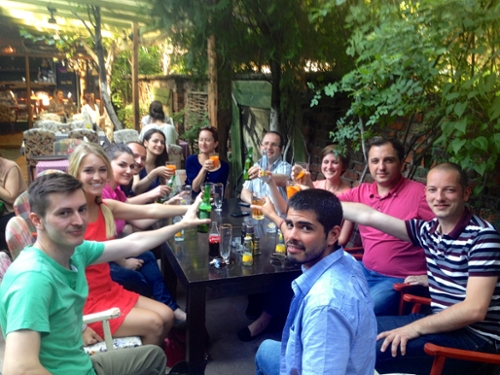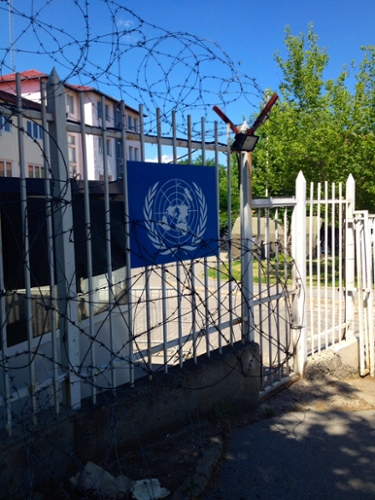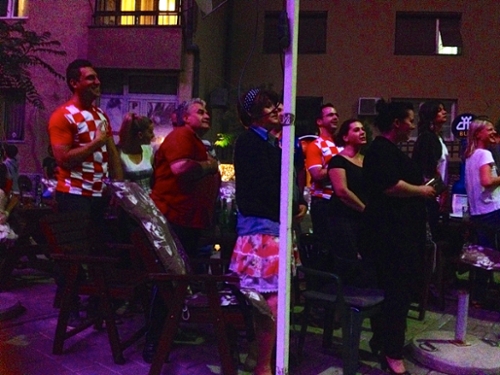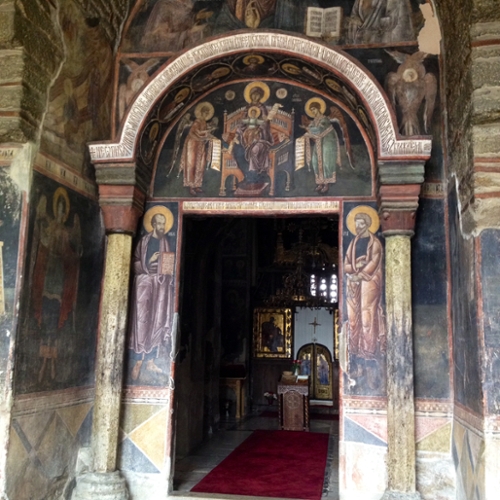War Crimes Trial in a Divided City
This past week has been eventful, spanning elections, my 24th birthday, a war crimes trial in Mitrovica, the beginning of the World Cup, and a quick trip to Roman ruins and a monastery in Gracanica.
Election Day (June 8, 2014): Elections are held on Sundays in Kosovo to encourage working people to go vote, the best reason to be in the office at 8:00 a.m. on the weekend. Unfortunately, the foreign interns at D4D weren't able to get accredited to observe elections like we hoped. What that meant was that, while we could travel to the polling stations with our accredited co-workers, we weren't allowed to go inside the rooms where people were voting to watch for fraud. Still, it was a good opportunity to get to travel to parts of Kosovo I hadn't been to before, so I brought along a book and prepared for a low-key day of sitting on a bench outside of polling stations while my co-workers observed.

The day ended up being more interesting, however, due to the fact that I somehow managed to run into the prime minister, Pristina's mayor, and the U.S. ambassador to Kosovo all in the span of a few hours. I mean, Kosovo is a small place, but I didn't expect to meet so many important political figures so suddenly.
After that excitement, my co-worker and I went to two polling stations in Drenas for the day, one in an elementary school and one in a high school. Turnout was low - there seemed to be more observers than voters. I waited outside in the foyer for the majority of the day catching up on some reading and people-watching.
Happy Birthday to Me (June 9, 2014): I had a Balkans birthday this year, which was spent with my co-workers and new friends. My kind friends took me out for every meal, and the night ended at a music festival in the middle of Pristina. I'm thankful for the wonderful people I'm surrounded with here.


War Crimes Trial in Mitrovica (June 12, 2014): Mitrovica is a city in northern Kosovo that is physically divided between the northern Serb community and the southern Albanian community. The bridge that spans the north and the south is partitioned with a big pile of rocks that bars traffic from going to either side. Of course, travel between the two sides is still possible around the bridge, but is complicated by certain factors. For instance, Erica and I had to switch taxis to go to the northern side, because our original taxi driver wouldn't go to the north. Also, if we were employees of the European Union Rule of Law Mission in Kosovo (EULEX), then we would have to travel to the north wearing helmets and bulletproof vests and ride in an armored car.
A EULEX judge and William & Mary Law alumnus invited Erica and I up to Mitrovica to see the opening statements of one of his war crimes trials. Because I can work remotely and my boss at D4D is eager for me to have "the Balkans experience," Erica and I ventured up north. For me, it was the first time passing into a predominately Serb area in Kosovo. The contrast was stark; the Serb part of Mitrovica is more rundown and is peppered with derogatory graffiti about the UN and EU. Erica and I arrived at the compound where the trial was held and, after passing security, took a seat in the back of a mostly-full courtroom.
We stayed at the trial from 9:30 a.m. until 2:30 p.m. with an hour break for lunch. During that time, we got to witness some very interesting things about the court system in Kosovo. There were twelve attorneys present. Some were local and some were international. Since Kosovo has three official languages - Albanian, English, and Serbian - everything had to be translated, which causes a lot of problems. As I've been editing an English translation of an Albanian text at work, I've seen firsthand how imperfect translation can be; it's really worrisome to think about how much substance is literally lost in translation.
I won't go into the specifics of the trial, but another issue that I would guess is pervasive in war crimes cases generally is evidentiary. The war was over 15 years ago, so the evidence about certain crimes was destroyed or doesn't exist any more. Many victims of war crimes were never found, adding another wrinkle into the equation. The EULEX judge later told us about how many witnesses are afraid to testify, creating yet another obstacle to information-gathering.
There are many issues, but the last I'll discuss is the eerie fact that one person's monster is another person's war hero. Crimes were committed by humans against humans during the war. Our trip to Mitrovica hammered in the complexities of securing justice for events that occurred during a war.

World Cup (June 12, 2014): I love that we're in Europe during the World Cup. Every night the cafes are packed with sports fans. The picture below is a group of Croatians supporting their team during the first game of the World Cup the other night.

Trip to Gracanica (June 15, 2014): Our history buff friend, Igor, took us to some Roman ruins in a field in Gracanica today. Afterwards, we went to an old, beautiful monastery that had very well-preserved murals. Gracanica is only a 15-minute taxi ride outside of Pristina, which is a testiment to the rich history we're surrounded with in Kosovo.


I can't believe we'll start week five of this adventure this week - the halfway point! I've learned so much already and look forward to the weeks ahead.